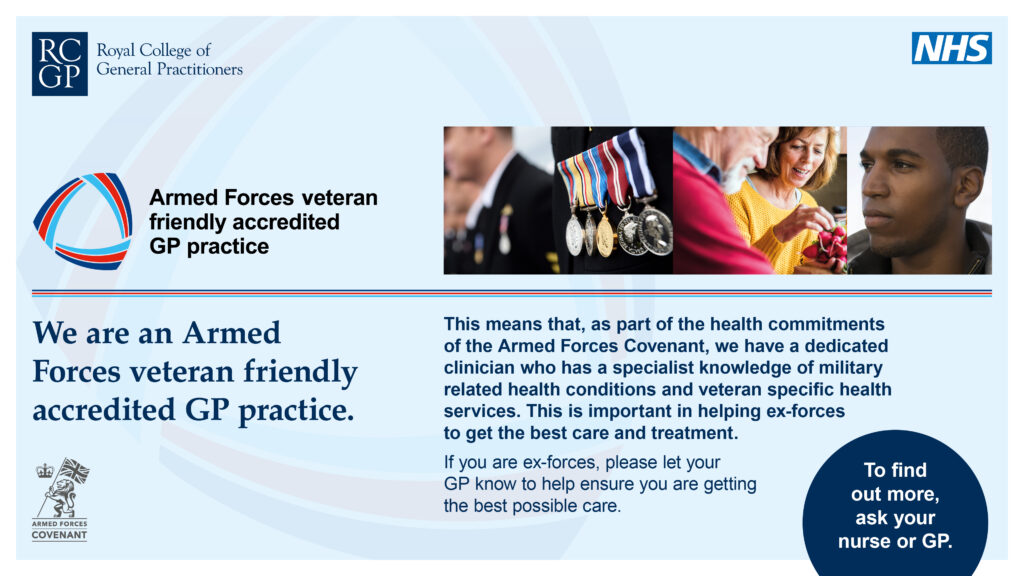We are pleased to announce that we have been accredited as a Veteran Friendly Practice. This is thanks to our Advanced Clinical Practitioner Jake Fretwell who is a veteran himself. His veteran status comes from 5 years as an army combat medic (working in army primary healthcare, regimental duties and military custody) – in these areas he has seen and helped serving soldiers with the mental ill-health. Certainly, whilst being here in the practice, he has picked up on a few ex-military who we didn’t realise were veterans and had a good chat about what’s on offer for them.
What is a veteran?
A veteran is anyone who has served for at least one day in the Armed Forces, whether as a regular or reservist. It means the same as ‘ex service personnel’ or ‘ex-forces’, although not all veterans know the term or choose to associate with the term ‘veteran’. Younger veterans might refer to themselves as ‘ex-forces’, in the belief that a veteran is someone who fought in the First / Second World War.
What is the Armed Forces Covenant?
The NHS has a duty to deliver on a number of health commitments, which are set out in the Armed Forces Covenant as follows:
• The Armed Forces community should enjoy the same standard of, and access to healthcare as that received by any other UK citizen in the area they live.
• Family members should retain their place on any NHS waiting list, if moved around the UK due to the service person being posted.
• Veterans should receive priority treatment for a condition which relates to their service, subject to clinical need.
• Those injured in service should be cared for in a way that reflects the nation’s moral obligation to them, by healthcare professionals who have an understanding of the Armed Forces culture.
This is reflected in principle four of the NHS Constitution, which states ‘the NHS will ensure that in line with the Armed Forces Covenant, those in the Armed Forces, reservists, their families and veterans are not disadvantaged in accessing health services in the area they reside’.
The Covenant is an important aspect of our approach to care, especially as the Armed Forces community can be at a disadvantage due to their mobility and frequent moves.
Top Tips for Veterans:
1. It is important to register with a GP, rather than wait until you need treatment. Visit the NHS website at www.nhs.uk to find details of GP practices in your local area.
2. If you’ve recently left the forces, it is important to give your GP the paperwork that your military medical centre gave you, including any medical records. This will help to make sure your military health record transfers to your NHS health record. This will also give your GP information on your health and ensure that any ongoing care and treatment is continued.
3. Regardless of when you left the military, tell your GP that you’ve served in the UK Armed Forces. This will help your GP to better understand any military related health conditions that you may have and ensure that you are referred, where appropriate, to dedicated services for veterans. This includes the specialist mental and physical health services, Op COURAGE: The Veterans Mental Health and Wellbeing Service and the Veterans Trauma Network. When using these services, you will be able to speak to people who:
• understand the Armed Forces and military life
• are either from the Armed Forces community or highly experienced in working with serving personnel, reservists, veterans and their families
• will work with you to make sure you get the right type of specialist care, support, and treatment
• work closely with a range of organisations and charities, including military charities, to support your wider health and wellbeing needs.
4. With your agreement, it can sometimes be helpful for your doctor to refer you to Armed Forces charities, such as SSAFA, the Royal British Legion, Combat Stress or Help for Heroes. They can often offer significant help and support, even if they do not all deliver healthcare.
5. You may be worried about sharing information about your time in the Armed Forces. Please note that the NHS is bound by a confidentiality code of practice to ensure GPs, nurses and other people working within the NHS deliver a confidential service bound by law.
